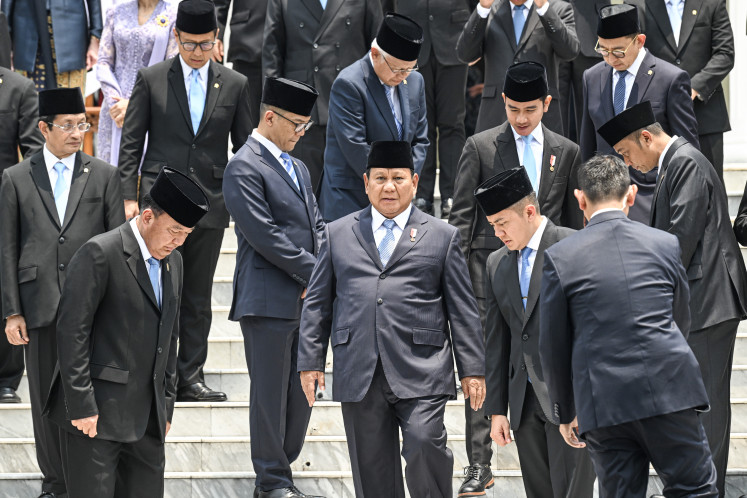Popular Reads
Top Results
Can't find what you're looking for?
View all search resultsPopular Reads
Top Results
Can't find what you're looking for?
View all search resultsSupervisor, GM named suspects in Mandom fire
The Jakarta Police have named two employees of a contractor that fixed gas installations at a new Mandom factory suspects for a fire that killed 28 on July 10 this year
Change text size
Gift Premium Articles
to Anyone
T
he Jakarta Police have named two employees of a contractor that fixed gas installations at a new Mandom factory suspects for a fire that killed 28 on July 10 this year.
The two suspects, identified as AH, an Indonesian, and ST, a Japanese citizen, are accused of being responsible for the fatal blaze at a new factory of the publicly listed cosmetics firm in Bekasi, West Java.
Jakarta police general crimes directorate head Sr. Comr. Khrisna Murti said that AH and ST were, respectively, a junior supervisor and a general manager from Iwatani Industrial Gas Indonesia, a contractor assigned to fix gas installations at the Mandom factory.
'We consider both suspects guilty, their negligence having caused fire and injuries, as well as fatalities, in the blaze at the Mandom factory on July 10,' Khrisna said in a press conference on Wednesday.
According to Khrisna, Mandom assigned Iwatani to install eight new flexible tubes in the aerosol production area. Mandom, which moved its cosmetic production to the Bekasi factory in April, said that it could no longer use its existing flexible tubes from the previous factory in Sunter, North Jakarta, because the tubes' lifetime had expired.
However, following the orders of general manager ST, AH installed only four new tubes and used the existing ones in the remaining places.
Khrisna added that the police also considered the two negligent, having failed to make any written report on a leakage check, including the gas pressure, which could later be used for supervision.
The general crimes directorate head said that the police also suspected other Iwatani employees, and would summon the company's management, including directors.
Currently, the police have only arrested AH, as ST returned to Japan after Mandom's Bekasi factory was completed in April. Nonetheless, the authorities have called for ST to appear for questioning next Monday in Jakarta.
'If he doesn't appear, we will send a red notice,' he said. A red notice is a warning for arrest issued by Interpol.
Khrisna added that aside from the two individual employees, Iwatani as a company was also liable for Mandom's loss, as the gas-installation contractor had issued guarantees to cover any failures related to its work.
At the same press conference, Jakarta Police state security directorate head Fadli Widiyanto said that the force had detected the source of the inferno after a series of investigations helped by a CCTV camera in the aerosol area.
Fadli explained that the fire had ignited in the drying machine, which was used to heat plastic wrap for packaging, after a leakage of liquid petroleum gas (LPG) from one of the flexible tubes spread to the heater in the drying machine.
'We presume that two victims, who died near the blast source, had spotted the leakage and approached the source before they could fix the problem,' Fadli said.
He further explained that the fire had quickly spread because of the severe leakage in addition to temperatures in the heater of 300 degrees Celsius. Only 3.24 seconds elapsed between the gas leakage and the explosion.
The fire alarm, Fadli went on, had not gone off, as it needed 18 seconds to detect a leak, and was able only, moreover, to detect leakage of standard gas, not LPG.
The fire engulfed Mandom's Bekasi factory on July 10; five workers were killed on the spot and 52 others were injured. The death toll increased gradually as the severely wounded did not survive. According to the police, the final toll is 28 dead.
Previously, a union member and Bekasi regency councilor dealing with labor issues, Nyumarno, said that the Mandom incident was the biggest workplace accident in the regency, and indeed the whole country, recorded this year.
Workers in chemical manufacturing and construction companies in Bekasi regency, known as an industrial area, Nyumarno said, were the most susceptible to work accidents and also to diseases resulting from work-related chemical exposure, ranging from asthma to kidney and pulmonary problems. (agn)










